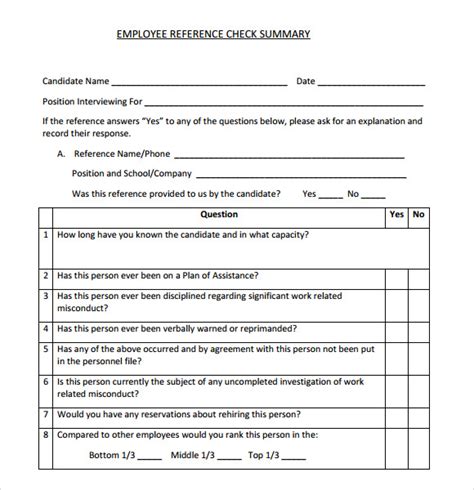Will Employers Verify Your References?

When it comes to job applications, it’s common to provide references to vouch for your professional background and skills. However, many job seekers wonder if their potential employers will actually verify their references. In this article, we’ll explore this topic in-depth and provide you with all the information you need to know.
What Are Employment References?
Employment references are individuals who can attest to your work experience, skills, and character. These individuals can include former managers, colleagues, or clients who have worked with you in a professional setting. When applying for a job, it’s common to include a list of references on your resume or job application.
Why Do Employers Ask for References?
Employers ask for references to verify your work history and to gain insight into your professional background. By speaking with your references, employers can learn more about your skills, work ethic, and character. This information can help them determine whether you’re a good fit for the job and the company culture.
Do Employers Verify References?
The short answer is yes, employers do verify references. It’s becoming increasingly common for employers to conduct background checks on potential employees, which can include contacting your references. In fact, a survey conducted by CareerBuilder found that 70% of employers check the references of job candidates.
How Do Employers Verify References?
Employers can verify your references in a variety of ways. They may contact your references via phone, email, or even social media. During these conversations, they may ask your references about your work history, job duties, and overall performance. They may also ask about your character and work ethic.
What Questions Do Employers Ask Your References?
Some common questions that employers may ask your references include:
- What was the candidate’s job title and job duties?
- How long did the candidate work for your company?
- What were the candidate’s strengths and weaknesses?
- Would you rehire the candidate?
- What was the candidate’s reason for leaving the company?
What Happens If Your References Can’t Be Reached?
If your references can’t be reached, it could potentially harm your chances of getting the job. Employers may view this as a red flag and question why your references aren’t available. It’s important to ensure that your references are willing and able to speak with potential employers.
What Happens If Your References Give Negative Feedback?
If your references give negative feedback, it could also harm your chances of getting the job. However, it’s important to keep in mind that employers may still consider you for the position if the negative feedback is minor or if they believe that you’ve made improvements since working with that particular reference.
Conclusion
In conclusion, employers do verify references and it’s important to choose references who can speak positively about your professional background and skills. Ensure that your references are willing and able to speak with potential employers and prepare them for the types of questions they may be asked. By doing so, you can increase your chances of landing the job.
FAQs
1. Who should I choose as a reference?
You should choose individuals who can speak positively about your professional background and skills. This can include former managers, colleagues, or clients who have worked with you in a professional setting.
2. How many references should I provide?
It’s common to provide three to five references. However, some employers may only ask for two references.
3. Can I use personal references?
While personal references may be able to speak to your character, it’s important to ensure that you also include professional references who can attest to your work experience and skills.
4. Can I ask my references to lie for me?
No, it’s never appropriate to ask your references to lie for you. This can harm your professional reputation and potentially harm your chances of getting the job.
5. Can I provide references from a previous job that I was fired from?
While it’s possible to provide references from a previous job that you were fired from, it’s important to ensure that these references can still speak positively about your professional background and skills. It’s also important to be honest with potential employers about the circumstances surrounding your departure from that job.
